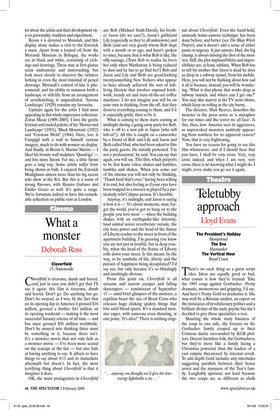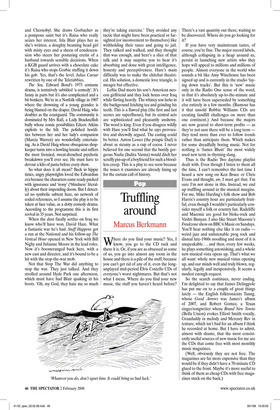Teletubby approach
Lloyd Evans
The President’s Holiday Hampstead The Sea Haymarket The Vertical Hour Royal Court
There’s no such thing as a great script idea. Ideas are equally good or bad, what counts is how they’re treated. Take the 1991 coup against Gorbachev. Pretty dramatic, momentous and gripping, I’d say. And here’s Penny Gold to dramatise it. She may well be a Russian analyst, an expert on the intricacies of revolutionary politics and a brilliant diviner of the male psyche but she’s decided to give those specialities a rest.
Shunting the whole nasty business of the coup to one side, she focuses on the Gorbachev family cooped up in their Crimean dacha surrounded by KGB plotters. Decent harmless folk, the Gorbachevs, but they’re more like a family facing a Christmas powercut than the leaders of a vast empire threatened by internal revolt. To add depth Gold includes arty interludes suggesting parallels between their house arrest and the massacre of the Tsar’s family. Laughably spurious, not least because the two coups are as different as chalk and Chernobyl. She draws Gorbachev as a pompous saint but it’s Raisa who really seizes her interest. Isla Blair plays her as she’s written, a doughty beaming head girl with misty eyes and a sheen of condescension who steers her posturing cretin of a husband towards sensible decisions. When a KGB guard arrives with a chocolate cake it’s Raisa who stops Gorbie stuffing it down his gob. Yes, that’s the level. Julius Caesar rewritten by one of the Teletubbies.
The Sea, Edward Bond’s 1973 costume drama, is tentatively subtitled ‘a comedy’. It’s funny in parts but it’s also complicated and a bit bonkers. We’re in a Norfolk village in 1907 where the drowning of a young grandee is being blamed on the draper, David Haig, who doubles as the coastguard. The community is dominated by Mrs Rafi, a Lady Bracknellish bully whose comic possibilities Eileen Atkins exploits to the hilt. The polished hostilities between her and her lady’s companion (Marcia Warren) are wonderfully entertaining. As is David Haig whose obsequious shopkeeper turns into a howling lunatic and suffers the most frenzied, sweat-drenched psychotic breakdown you’ll ever see. He must have to devour a kilo of pasta before every show.
So what does it all mean? Back in hippie times, angry playwrights loved the Edwardian era because the characters came ready-packed with ignorance and ‘irony’ (‘blindness’ literally) about their impending doom. But I detected no symbolic subtext here, no network of coded references, so I assume the play is to be taken at face value, as a dotty comedy drama. According to the programme this is its first revival in 35 years. Not surprised.
When the dust finally settles on Iraq we know who’ll have won. David Hare. What a fantastic war he’s had. Stuff Happens got a run at the National and his follow-up The Vertical Hour opened in New York with Bill Nighy and Julianne Moore in the lead roles. Now it’s boomeranged back here, with a new cast and director, and it’s bound to be a hit with the stop-the-war mob.
Not that Stop The War did anything to stop the war. They just talked. And they strolled around Hyde Park one afternoon, which must have had Blair quaking in his boots. ‘Oh, my God, they hate me so much they’re taking exercise.’ They avoided any tactic that might have been practical or farsighted (or inconvenient to themselves) like withholding their taxes and going to jail. They talked and walked, and they thought that was enough, and here’s a slice of that talk and it may surprise you to hear it’s absorbing and done with great intelligence, honesty and perceptiveness. Hare’s main difficulty was to make the chitchat theatrical. His solution, a domestic love triangle, is meagre but effective.
Leftie Dad meets his son’s American neocon girlfriend and they lock horns over Iraq while flirting heavily. The whiney son lurks in the background fetching tea and grinding his teeth. This is a flawed play (the first and last scenes are superfluous), but its central acts are sophisticated and pleasantly unshowy. The word is king. Even if you disagree wildly with Hare you’ll find what he says provocative and shrewdly argued. The casting could be better. Anton Lesser (the priapic Dad) is about as steamy as a cup of cocoa. I never believed for one second that the bustily gorgeous Nadia (Indira Varma) would ditch her scruffy pin-up of a boyfriend for such a bloodless creep. This is a play to see soon because the issues it examines are already lining up for the curtain call of history.



































































 Previous page
Previous page